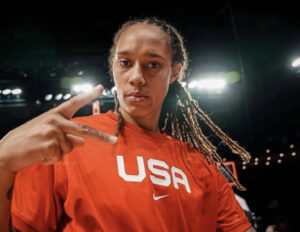CELEBRITY
Reba weighed in on the continuing issue of protest kneelers after hearing that Brittney Griner says she’ll take a knee during the National Anthem in Paris if Team USA wins a medal.


The Intersection of Patriotism and Protest: Reba McEntire’s Response to Brittney Griner’s Anthem Stance
In recent years, the intersection of sports, protest, and patriotism has become a hotly debated issue, both in the United States and around the world. The latest chapter in this ongoing saga involves country music legend Reba McEntire’s reaction to WNBA star Brittney Griner’s statement that she plans to kneel during the National Anthem if Team USA wins a medal at the Paris Olympics. McEntire, a staunch advocate for traditional values and patriotism, weighed in on this issue, adding her voice to a chorus of opinions that have come to define the conversation around athletes and political expression.
The Power of the National Anthem in American Culture
The National Anthem holds a special place in American culture, symbolizing the values and freedoms that the country was founded upon. For many, standing during the anthem is a sign of respect for the sacrifices made by those who have served the nation and a moment of unity that transcends differences. Reba McEntire, known for her deep connection to country music and American traditions, likely sees the anthem as a sacred moment that should be honored.
From McEntire’s perspective, kneeling during the National Anthem could be seen as a rejection of the values that the anthem represents. This view is shared by many who believe that the anthem is not the appropriate time or place for political protest. For them, the act of kneeling can be perceived as disrespectful to the country and those who have fought to protect it.

On the other hand, athletes like Brittney Griner see their platform as an opportunity to bring attention to social issues that they believe require urgent attention. For Griner, kneeling during the National Anthem is not an act of disrespect, but rather a powerful statement against racial injustice, inequality, and systemic oppression. The decision to kneel is a form of peaceful protest, a way to use her visibility on the global stage to spark conversations and inspire change.
This perspective aligns with the broader movement that began with former NFL quarterback Colin Kaepernick, who first knelt during the anthem in 2016 to protest police brutality. Since then, numerous athletes across different sports have followed suit, using their influence to highlight social injustices. For these athletes, the act of kneeling is a call to action, a reminder that the fight for equality and justice is far from over.
The Ongoing Debate: Patriotism vs. Protest
The debate over kneeling during the National Anthem highlights a deeper tension in American society: the balance between patriotism and the right to protest. Reba McEntire’s reaction to Griner’s stance reflects the belief that patriotism should be expressed through traditional forms of respect, such as standing during the anthem. This view prioritizes national unity and reverence for the symbols that represent the country.









